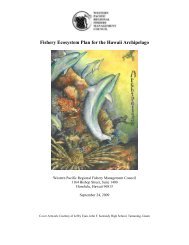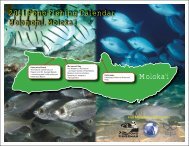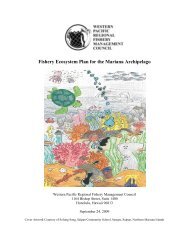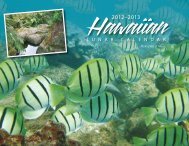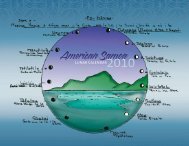Shark Depredation and Unwanted Bycatch in Pelagic Longline
Shark Depredation and Unwanted Bycatch in Pelagic Longline
Shark Depredation and Unwanted Bycatch in Pelagic Longline
Create successful ePaper yourself
Turn your PDF publications into a flip-book with our unique Google optimized e-Paper software.
<strong>Shark</strong> <strong>Depredation</strong> <strong>and</strong> <strong>Unwanted</strong> <strong>Bycatch</strong> <strong>in</strong> <strong>Pelagic</strong> Longl<strong>in</strong>e Fisheries<br />
A2.14.5. Reduc<strong>in</strong>g the attractiveness of baited hooks to<br />
sharks, such as by us<strong>in</strong>g artificial baits, us<strong>in</strong>g or not us<strong>in</strong>g<br />
light sticks, or avoid<strong>in</strong>g a bait type known to result <strong>in</strong> high<br />
shark catch rates<br />
Over a quarter (26.3%) of mahi mahi fishermen believe that avoid<strong>in</strong>g<br />
bait types known to result <strong>in</strong> high shark catch rates would reduce<br />
shark <strong>in</strong>teractions. About two thirds (63%) of respondents replied<br />
that these strategies would not be effective. Of these, two fishermen<br />
(16.7%) replied that shark <strong>in</strong>teractions occur even when not us<strong>in</strong>g bait<br />
types typically employed for shark capture. Three respondents (25%)<br />
believe artificial bait would not be economically viable for mahi mahi<br />
capture s<strong>in</strong>ce bait type for this target species is captured fresh before<br />
the sett<strong>in</strong>g of the longl<strong>in</strong>e. Two of three swordfish fishermen replied<br />
that they believe these strategies would reduce shark captures.<br />
A2.14.6. Reduc<strong>in</strong>g <strong>in</strong>jury to hooked sharks that you will discard<br />
Almost a quarter (25.1%) of all respondents with mahi mahi as<br />
target species reported discard<strong>in</strong>g small sharks alive. Of these, three<br />
quarters (75%) did not <strong>in</strong>dicate a way to reduce <strong>in</strong>jury to hooked<br />
sharks that they will discard, while the rema<strong>in</strong>der replied that the use<br />
of dehookers will not reduce <strong>in</strong>jury to hooked sharks for discard<strong>in</strong>g.<br />
One respondent (5.3%) mentioned that he uses a dehooker to recover<br />
hooks from sharks when these are on board <strong>and</strong> already dead.<br />
No swordfish fishermen reported discard<strong>in</strong>g sharks alive. However,<br />
one of them said that they would discard blue sharks due low storage<br />
capacity. It is unclear whether or not they f<strong>in</strong> those sharks before<br />
discard<strong>in</strong>g.<br />
A2.14.7. Reduc<strong>in</strong>g shark retention by avoid<strong>in</strong>g a specific<br />
size or type of hook, or by not us<strong>in</strong>g wire leaders on branch<br />
l<strong>in</strong>es<br />
Of mahi mahi fishemen, only one respondent (5.3%) replied that<br />
the size of the hook would affect the shark catch rate. About 36.8%<br />
(among whom there were fishermen that use both nylon <strong>and</strong> wire<br />
leaders) replied that shark retention is or would be reduced by not<br />
us<strong>in</strong>g a wire leader on their branch l<strong>in</strong>es. Three fishermen (15.7%)<br />
that use wire leaders believe that us<strong>in</strong>g nylon monofilament would<br />
mean an <strong>in</strong>crease <strong>in</strong> gear loss from sharks. Some respondents use<br />
nylon monofilament only because they believe that us<strong>in</strong>g wire leaders<br />
would decrease their target species capture dur<strong>in</strong>g the summer. Wire<br />
leaders are used dur<strong>in</strong>g shark season to <strong>in</strong>crease shark capture.<br />
Two swordfish fishermen <strong>in</strong>dicated that not us<strong>in</strong>g wire leaders will<br />
reduce shark retention.<br />
A2.14.8. Will the economic impact of sharks be reduced<br />
from us<strong>in</strong>g a wire leader on branch l<strong>in</strong>es<br />
Most respondents (73.7%) that fish for mahi mahi believe that<br />
the economic impact of sharks is or would be reduced by us<strong>in</strong>g a<br />
wire leader on branch l<strong>in</strong>es. Among those respondents were all of<br />
the ones that use wire leaders <strong>and</strong> two thirds of fishermen that use<br />
nylon monofilament. One of the latter stated that he will not switch<br />
to wire leader because it would reduce his target species capture.<br />
However, another fisherman that use wire leaders mentioned that<br />
target species capture rema<strong>in</strong>s the same as if us<strong>in</strong>g nylon monofilament.<br />
All three swordfish fishermen <strong>in</strong>terviewed believe that the cost from<br />
damage to gear is or would be reduced by us<strong>in</strong>g wire traces on branch<br />
l<strong>in</strong>es.<br />
A2.14.9. Most important factor that affects shark CPUE<br />
Over two thirds (68%) of mahi mahi fishermen believe that alter<strong>in</strong>g<br />
fish<strong>in</strong>g position <strong>in</strong> relation to certa<strong>in</strong> water temperatures alone will<br />
result <strong>in</strong> a high shark catch rate. The other third (32%) replied that<br />
a comb<strong>in</strong>ation of different factors results <strong>in</strong> a high shark catch rate.<br />
Half of these respondents did not specify these factors. Equal amount<br />
of respondents replied (1) that alter<strong>in</strong>g fish<strong>in</strong>g position <strong>and</strong> sett<strong>in</strong>g<br />
gear deeper will <strong>in</strong>crease shark CPUE, (2) that time of month was an<br />
important factor along with alter<strong>in</strong>g fish<strong>in</strong>g position <strong>in</strong> shark capture,<br />
or (3) that it is certa<strong>in</strong> water temperatures together with time of the day<br />
that are the most important factors affect<strong>in</strong>g shark CPUE. Respondents<br />
based their answer on their fish<strong>in</strong>g practices dur<strong>in</strong>g shark season.<br />
Accord<strong>in</strong>g to all swordfish fishermen, it is a comb<strong>in</strong>ation of different<br />
factors that will affect shark CPUE, but they did not specify these factors.<br />
A2.15. Incentives <strong>and</strong> Attitudes on Reduc<strong>in</strong>g <strong>Shark</strong><br />
<strong>Bycatch</strong> <strong>and</strong> <strong>Depredation</strong><br />
In general, both swordfish <strong>and</strong> mahi mahi fishermen <strong>in</strong>terviewed<br />
(95%) are not <strong>in</strong>terested <strong>in</strong> reduc<strong>in</strong>g shark bycatch. Forty-seven<br />
percent <strong>and</strong> 33.3% of mahi mahi <strong>and</strong> swordfish fishermen,<br />
respectively, are <strong>in</strong>terested <strong>in</strong> reduc<strong>in</strong>g shark depredation.<br />
The most common reason given by mahi mahi fishermen for not<br />
want<strong>in</strong>g to reduce shark <strong>in</strong>teractions is because of the high value for<br />
shark meat <strong>and</strong> f<strong>in</strong>s. Swordfish fishermen also mentioned that they<br />
do not want to avoid catch<strong>in</strong>g shark because it is profitable. Only<br />
one fisherman from a swordfish vessel replied that he wants to avoid<br />
shark <strong>in</strong>teractions because they are not his target species.<br />
Over two thirds (68.4%) of respondents believe, <strong>in</strong> the absence<br />
of restrictions on f<strong>in</strong>n<strong>in</strong>g sharks, that bycatch dur<strong>in</strong>g mahi mahi<br />
season would not mean a decl<strong>in</strong>e of shark populations. Two mahi<br />
mahi fishermen (9.1%) replied that shark bycatch dur<strong>in</strong>g summer<br />
time is not high enough to threaten shark populations. Another two<br />
fishermen blamed <strong>in</strong>dustrial vessels for decl<strong>in</strong>es <strong>in</strong> shark populations<br />
due to f<strong>in</strong>n<strong>in</strong>g aboard these vessels.<br />
About 72% of respondents stated that their general feel<strong>in</strong>gs about<br />
sharks are that they are economically important. For them, sharks<br />
mean mostly extra <strong>in</strong>come. One swordfish fisherman (4.5% of<br />
respondents) mentioned that it is sometimes annoy<strong>in</strong>g hav<strong>in</strong>g many<br />
sharks <strong>in</strong> the l<strong>in</strong>e. Six (27.3%) respondents stated that sharks should<br />
be under susta<strong>in</strong>able management program. They believe shark<br />
populations have decl<strong>in</strong>ed with<strong>in</strong> the past years <strong>and</strong> that penalties,<br />
bans, <strong>and</strong> more control over <strong>in</strong>dustrial vessels should be enforced for<br />
conservation purposes.<br />
A2.16. Support<strong>in</strong>g Figures<br />
Figs. A2.8 – A2.16 provide images of the fisheries described <strong>in</strong> this<br />
contribution.<br />
64



